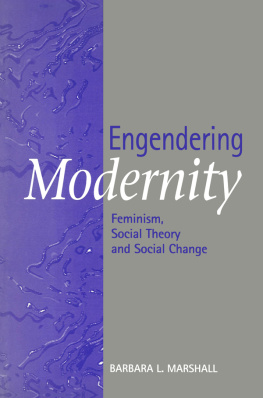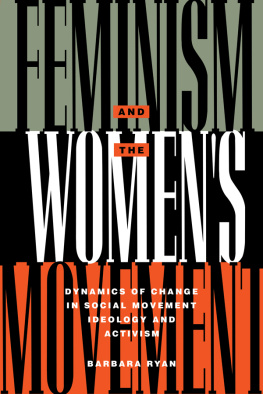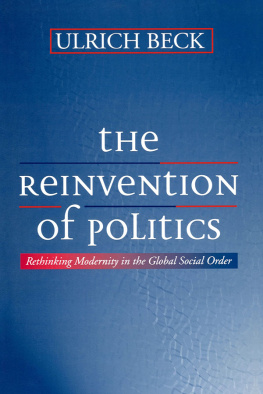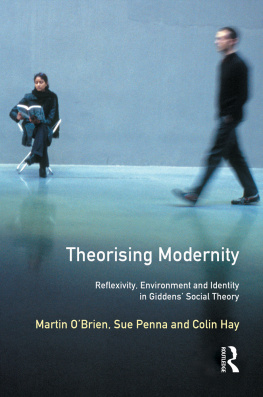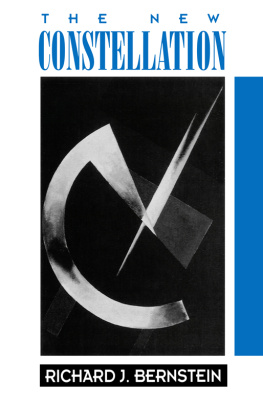Barbara L. Marshall - Engendering Modernity: Feminism, Social Theory and Social Change
Here you can read online Barbara L. Marshall - Engendering Modernity: Feminism, Social Theory and Social Change full text of the book (entire story) in english for free. Download pdf and epub, get meaning, cover and reviews about this ebook. year: 2013, publisher: Polity Press, genre: Politics. Description of the work, (preface) as well as reviews are available. Best literature library LitArk.com created for fans of good reading and offers a wide selection of genres:
Romance novel
Science fiction
Adventure
Detective
Science
History
Home and family
Prose
Art
Politics
Computer
Non-fiction
Religion
Business
Children
Humor
Choose a favorite category and find really read worthwhile books. Enjoy immersion in the world of imagination, feel the emotions of the characters or learn something new for yourself, make an fascinating discovery.
- Book:Engendering Modernity: Feminism, Social Theory and Social Change
- Author:
- Publisher:Polity Press
- Genre:
- Year:2013
- Rating:5 / 5
- Favourites:Add to favourites
- Your mark:
- 100
- 1
- 2
- 3
- 4
- 5
Engendering Modernity: Feminism, Social Theory and Social Change: summary, description and annotation
We offer to read an annotation, description, summary or preface (depends on what the author of the book "Engendering Modernity: Feminism, Social Theory and Social Change" wrote himself). If you haven't found the necessary information about the book — write in the comments, we will try to find it.
Engendering Modernity: Feminism, Social Theory and Social Change — read online for free the complete book (whole text) full work
Below is the text of the book, divided by pages. System saving the place of the last page read, allows you to conveniently read the book "Engendering Modernity: Feminism, Social Theory and Social Change" online for free, without having to search again every time where you left off. Put a bookmark, and you can go to the page where you finished reading at any time.
Font size:
Interval:
Bookmark:
ENGENDERING MODERNITY
Feminism, Social Theory and Social Change
Barbara L. Marshall
Polity Press
Copyright Barbara L. Marshall 1994
The right of Barbara L. Marshall to be identified as author of this work has been asserted in accordance with the Copyright, Designs and Patents Act 1988.
First published in 1994 by Polity Press in association with Blackwell Publishers
Reprinted 2005, 2007
Polity Press
65 Bridge Street
Cambridge CB2 1UR, UK
Polity Press
350 Main Street
Malden, MA 02148, USA
All rights reserved. Except for the quotation of short passages for the purposes of criticism and review, no part of this publication may be reproduced, stored in a retrieval system, or transmitted, in any form or by any means, electronic, mechanical, photocopying, recording or otherwise, without the prior permission of the publisher.
Except in the United States of America, this book is sold subject to the condition that it shall not, by way of trade or otherwise, be lent, re-sold, hired out, or otherwise circulated without the publishers prior consent in any form of binding or cover other than that in which it is published and without a similar condition including this condition being imposed on the subsequent purchaser.
ISBN: 978-0-7456-0927-0
ISBN: 978-0-7456-0928-7 (pbk)
ISBN: 978-0-7456-6770-6 (ebook)
British Library Cataloguing-in-Publication Data
A CIP catalogue record for this book is available from the British Library.
Typeset in 12 on 13 pt Garamond by Photoprint, Torquay.
Printed and bound in Great Britain by Marston Book Services Limited, Oxford
This book is printed on acid-free paper.
For further information on Polity, visit our website: www.polity.co.uk
Contents
For my mother, Maeve Marshall
Acknowledgements
This book has taken shape over a long period of time, during which many teachers, colleagues and students assisted me in developing my analysis. In particular I wish to thank Graham Lowe, Harvey Krahn, Derek Sayer, Susan Jackel, Marg Hobbs, Joan Sangster, Sedef Arat-Ko, Susan Lang, Robyn Diner, David Brown and Marie Carlson for stimulating many of the ideas developed here. My greatest intellectual debt is to Ray Morrow, who as both teacher and friend has always pushed me to think things through and, while we have not always agreed on the answers, has suggested many of the questions that I have tackled.
I am grateful to the Social Sciences and Humanities Research Council of Canada for financial support in the form of a doctoral fellowship, as well as to Trent University for a Research Fellowship and a grant from the Sub-committee on Research in the Arts.
Friends and family deserve much of the credit for seeing this book through to fruition. Special thanks to Frances Adams, for always being there, and to Judy Pinto, for keeping my life organized. Love and thanks go especially to my husband, Yiannis Kiparissis, who has borne more than his fair share of both domestic labour and the frustrations of writers block. Our daughter Lucy, born during the preparation of the manuscript, has made it all worthwhile.
Finally, the people at Polity Press have been a delight to work with, from start to finish.
Permission to use previously published material was generously granted as follows:
Some of the material in was published in my Critical Theory and Feminist Theory, Canadian Review of Sociology and Anthropology, 25 (2), 1988, and is used here by permission of that journal.
An earlier version of was previously published as Reproducing the Gendered Subject, in Current Perspectives in Social Theory, 11 (1991), and is used here by permission of JAI Press.
Introduction
This is a book about theory, written at a time when the very practice of theory has become increasingly suspect. I write as a feminist, and as a sociologist, who has been caught up in the debates about the status and purpose of theory, and who has had to confront some of the resulting questions about theory in both my teaching and my research. The practice of theory has been deeply affected by the debates about modernity versus postmodernity, and the attendant questions of the possibility of social theory which can foster human autonomy and emancipation. The assertions by certain theorists, such as Baudrillard, Derrida, Foucault, Lyotard and Rorty, that such theoretical aspirations are tied irredeemably to the now pass modern pistme, suggest that theory as an emancipatory project is indeed at an end. My basic premise is that these assertions are far from neutral. I see them as emanating from the same position of false universalism as that of the theoretical tradition they criticize. In other words, they express, as Christine Di Stephano puts it, the claims and needs of a constituency (white, privileged men of the industrialized West) that has already had an Enlightenment for itself and that is now ready and willing to subject that legacy to critical scrutiny (1990: 75). Just as feminist historians and social theorists begin to reconstruct the ambivalent relationship of women to modernity, and to breathe new life into its emancipatory project, this very project is deemed bankrupt. I want to argue that, flawed as it is, the modern project still contains considerable potential to ground an emancipatory practice, and that some recent feminist theory is paradigmatic of how such a project might be reconstructed or engendered.
I first used the term engender, in the manner in which I use it here, several years ago as I was working on a conference paper on women and the welfare state. I was struggling for a term which recognized the crucial role gender played in the initial construction of the welfare state, and which captured the active way in which gender is continually embedded in the operation of, and our experience of, welfare states today. I chose the term engendering both for its dictionary meaning of engender to enable or bring about and for etymological reasons. The prefix en- is commonly used to make a transitive verb out of a noun, as in endear or encircle. Thus it is in this dual sense that I want to speak of engendering modernity. I want to draw attention to the restructuring of gender relations as a fundamental characteristic of modernity, and to nurture a feminist vision of the emancipatory potential of social theory as a modern project.
To do this requires some major rethinking of the basic analytical categories of social theory, categories such as the individual, society, class, citizenship. The experience of women has always been peripheral to the construction of these categories, and as this experience is reclaimed and inserted into the heart of social theory, the inadequacy of these categories, as traditionally conceived, becomes painfully apparent. Singled out for particular critique is the relationship between the individual and society as this has been understood in both classical and contemporary theories of modernity. The sociological individual, while ostensibly the universal subject of modernity, obscures a deeply gendered analysis of social life. Such a conception of the individual is premised upon a set of dualistic categories, such as public versus private, economy versus family, universal versus particular, which are constructed on the experience of Western, white, heterosexual males, and which have been overly abstracted and reified in social theory. As we begin to deconstruct these dualisms to better account for wider experiences of social life, the potential for theorizing the individualsociety relationship in new ways arises. New questions around the subject and political agency, and the emergence of distinctively modern contexts for identity formation rise to the top of the theoretical agenda. The central aim of this book, then, is to undertake the dual tasks of providing a revised account of modernity one which includes the experience of women and of considering what sort of a theoretical framework might be built on this revised account.
Next pageFont size:
Interval:
Bookmark:
Similar books «Engendering Modernity: Feminism, Social Theory and Social Change»
Look at similar books to Engendering Modernity: Feminism, Social Theory and Social Change. We have selected literature similar in name and meaning in the hope of providing readers with more options to find new, interesting, not yet read works.
Discussion, reviews of the book Engendering Modernity: Feminism, Social Theory and Social Change and just readers' own opinions. Leave your comments, write what you think about the work, its meaning or the main characters. Specify what exactly you liked and what you didn't like, and why you think so.

